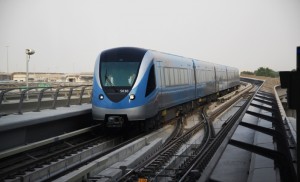By Ashfaq Ahmed, Chief Reporter; Mahmood Saberi, Senior Reporter and Rayeesa Absal, Staff Reporter www.gulfnews.com
Dubai/Abu Dhabi: Commuters in the UAE can expect better traffic flow and an improved public transport system in the new year.

Abu Dhabi’s Al Salam road project in addition to new bridges are bound to ease traffic in the capital. Besides, the Union Rail project — which is beginning to take shape — bodes well for commuters too. Dubai Metro’s most awaited element — the Green Line — will open its doors to passengers this year, thereby completing the Dh28 billion Metro project, as part of a comprehensive integrated public transport system.
As the Metro has already become very popular among commuters, the opening of the 22.9 kilometre Green Line will allow more commuters to save on travel time. The Green Line — which runs from Al Qusais to Al Jaddaf, passing through Al Qiyadah, Abu Hail, Saluddin Roads, Union Square, Baniyas, Gold Souq, Al Ras, Al Ghubaiba, Al Fahidi, Khalid Bin Waleed, Oud Metha and Dubai Healthcare City stations — is expected to open in August.
Meanwhile, the Roads and Transport Authority (RTA) will complete a number of major roads and infrastructure projects. One initiative is the Parallel Roads project in the Business Bay area which is set to be completed in the first half of 2011.
The road begins at Shaikh Rashid Road in the north, near the Dubai World Trade Centre, and extends southward to the outskirts of the Dubai-Abu Dhabi border. Its total length is 128 kilometres (64km on each side) and includes several bridges and intersections. The completion of the First Interchange on Shaikh Zayed Road next month will be yet another milestone for the RTA. By the end of January, all associated roads, bridges and tunnels are expected to be completed too.
The new interchange will provide free traffic flow in all areas linking Shaikh Zayed Road and the upper and lower decks of the Financial Centre Road and Al Safa Road.
The RTA also aims to complete Al Ittihad Road valued at Dh900 million. This will include the development of an eight-lane expressway along a 7.5-kilometre road between Al Nahda Interchange near Sharjah and Al Garhoud Bridge. The RTA will also continue to work on Al Khail Road to replace the roundabout with interchanges.
Other areas
The health care sector occupies an important segment of the economy as the number of people living and working in the UAE continues to grow.
An influx of new workers and an ageing population — beset with lifestyle diseases such as diabetes — raises immense challenges to health care providers in the coming years. Qadi Saeed Al Murooshid, Director-General of the Dubai Health Authority (DHA) announced the implementation of future health care projects valued at Dh3.6 billion.
He added that these projects have been designed keeping in mind the population growth and geographic expansion of Dubai.
“We are working at all levels to access capacity requirements and fulfil them. In the next two years, the projects that we currently have in our pipeline will increase our bed space by 650 beds. In addition to the DHA projects, the upcoming private sector projects will also increase bed capacity by an additional 500 beds,” he said.
Meanwhile, in Abu Dhabi, there was an announcement of plans to construct a new Mafraq Hospital. The hospital will be spread over 245,000 square metres and will include 690 beds. It is scheduled to be completed by 2013.
Abu Dhabi is also looking at the private sector to meet its population’s health care demands. The Abu Dhabi Health Services Company (Seha) said it is planning a series of new ambulatory health care clinics in Abu Dhabi and Al Ain. The Executive Council has backed its plans to deliver health care facilities “comparable to the best offered in the world”. The clinics are set to be completed by 2012.
Education
In 2010, the education landscape in Dubai was rather volatile with a difference of opinion between the federal Ministry of Education and the Knowledge and Human Development Authority (KHDA). While the ministry said that some schools deserve to increase their fees, KHDA issued a blanket ban against them. Talks were initiated to resolve the crisis.
Meanwhile, the ministry’s structure underwent a revamp following which changes in jurisdiction of the federal and local bodies are expected to be announced in 2011.


















